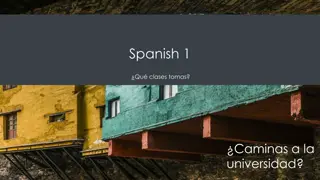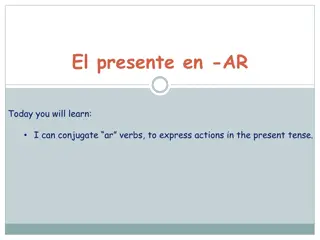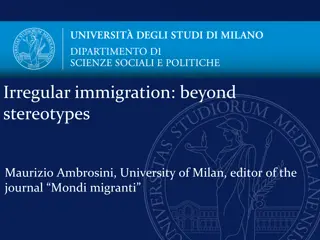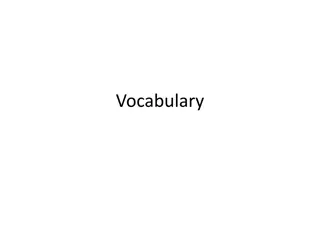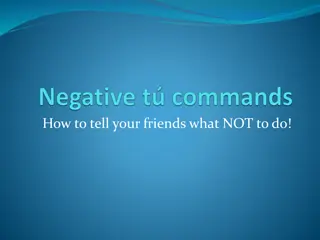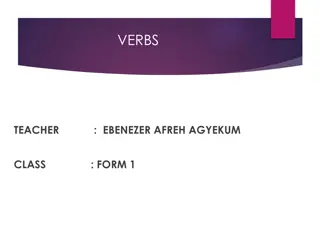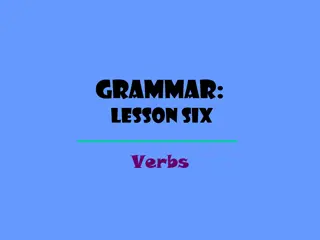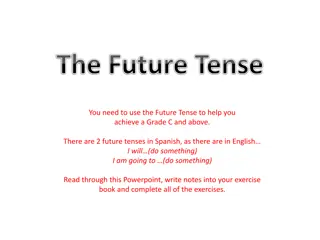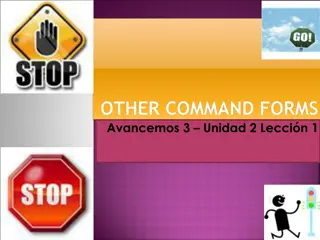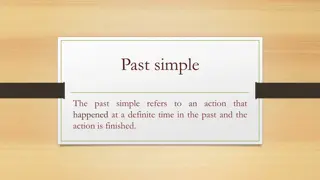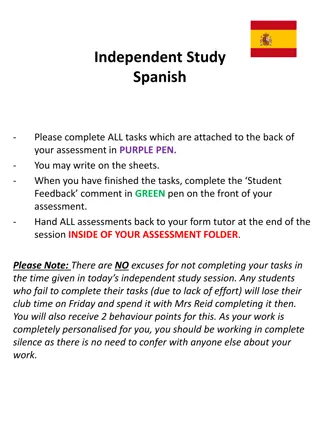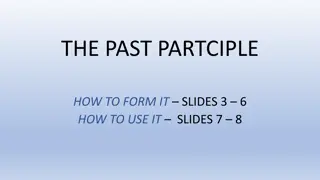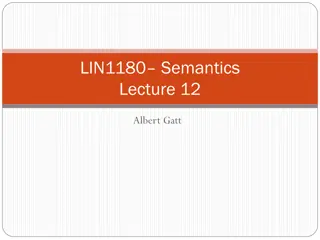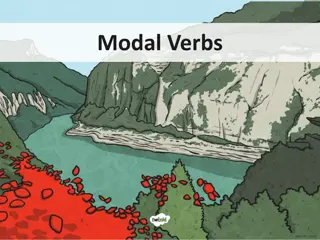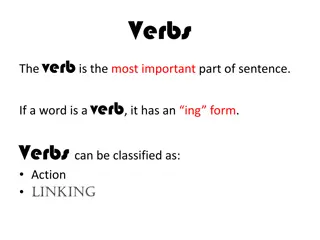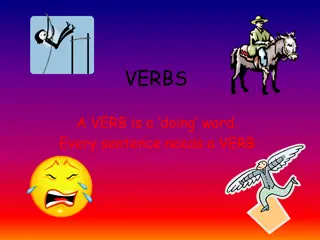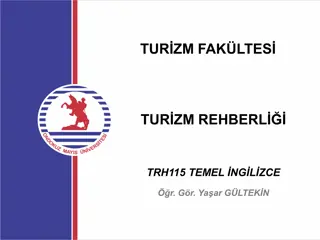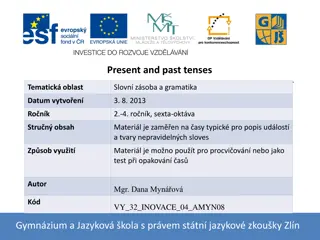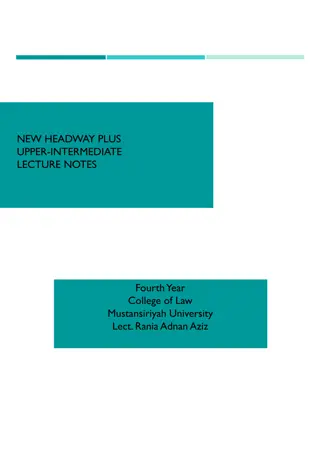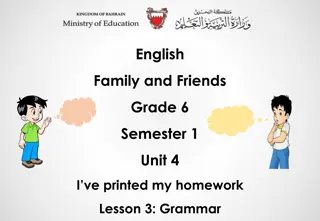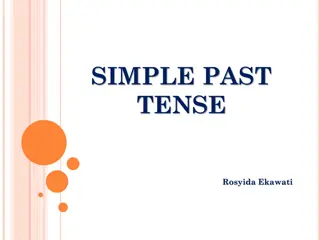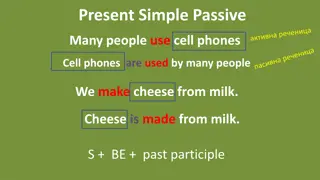Advanced Spanish Preterite Tense Irregular Verbs and Conjugations
Dive into advanced Spanish conversation with a focus on preterite tense irregular verbs and conjugations. Practice sentence translations, engage in conversation exercises using the preterite tense, learn new vocabulary, and review general notes for past tense usage in Spanish. Explore the conjugations of irregular verbs like SER, IR, DAR, and VER, and discover more irregular past tense conjugations with special features.
Download Presentation

Please find below an Image/Link to download the presentation.
The content on the website is provided AS IS for your information and personal use only. It may not be sold, licensed, or shared on other websites without obtaining consent from the author. Download presentation by click this link. If you encounter any issues during the download, it is possible that the publisher has removed the file from their server.
E N D
Presentation Transcript
Futura Language Professionals Adult Conversation Class Advanced Part 1 Week 3
Week 3 contents 1. Preterite tense Irregular verbs and conjugations 2. Practice- Sentence translations 3. Break out Rooms- conversation practice using preterite tense 4. More practice conjugating verbs and creating sentences 5. New vocabulary- infinitive verb list
Review: General notes for past tense in Spanish- the preterite tense is used to express past actions that are seen as completed in the past or as having happened once. Next week we will begin learning about the imperfect tense. Check in questions: Do the -AR, -IR, & -ER ending verbs conjugate the same in preterite tense? Do stem-changing verbs have stem changes in the preterite tense? -AR verbs whose stems end in what 3 letters have spelling changes in the yo form? New Lesson: Preterite tense irregulars Hay muchos verbos irregulares en el pret rito. There are many irregular verbs in the preterite tense. Let s review some of the irregulars from last class and learn additional irregulars today.
Los verbos SER e IR tienen las mismas conjugaciones en el pret rito. The verbs SER (to be) and IR (to go) have the same conjugations in the preterite. These are commonly used verbs and do not follow the traditional steps for regular conjugation. Instead, the preterite tense stem is fu . Please view the conjugation chart below for the complete conjugations.
Dar (to give) *new Yo t l/ella/Usted Examples/Practice: di diste dio nosotros(as) vosotros(as) ellos/ellas/ustedes dieron dimos disteis Yesterday, she gave me a present for my birthday. oAyer, ella me dio un regalo por mi cumplea os. He gave her flowers on Valentine s day last week. o l dio flores el d a de San Valent n la semana pasada. We gave them candy for Halloween. oLes dimos dulces para el d a de brujas. *The preterite tense of hay is hubo. Ver (to see) *This is regular in preterite, but the yo and l/ella/Usted forms are written without accent marks. This is because they are forms of one syllable. Yo t l/ella/Usted vi viste vio nosotros(as) vosotros(as) ellos/ellas/ustedes vieron vimos visteis
New Lesson: More Irregular Past Tense Conjugations: Irregular preterites in Spanish have two features: an irregular stem and a special set of endings. Note: the yo and l forms are stressed on the stem, not on the ending. When conjugated into the preterite tense, the root vowel in the stem of some verbs changes to -u. This change is the same for all forms of person (pronouns). For some verbs, the root vowel changes to -i. For some verbs, add -uv at the end of the root. For some verbs, add a -j. Please see the chart visual below for specific examples. 1. Hacer (to do or to make): hic-, *hiz- (The l/ella/Ud. Form of hacer is spelled with a z, not a c as in the other forms.) 2. Querer (to want): quis- 3. Venir (to come): vin- 4. Estar (to be): estuv- 5. Tener (to have): tuv- 6. Andar (to go around): anduv- 7. Poder (to be able to): pud- 8. Poner (to put): pus- 9. Saber (to know): sup- 10. Decir (to say/tell): dij- (*eron in ellos/ellas/Uds- in this form it loses the i of the -ieron ending.) 11. Traer (to bring): traj- (*eron in ellos/ellas/Uds- in this form it loses the i of the -ieron ending.) 12. Caber (to fit): cup- Irregular Endings: - -iste - -imos -isteis -ieron/*eron
All verbs ending in -ducir have a preterite stem with the vowel u. Example: Producir- to produce produje produjiste produjo produjimos produjisteis produjeron The verb traer has a in the stem of the preterite. Traer- to bring traje trajiste trajo trajimos trajisteis trajeron Notes: All preterite stems ending in j lose the i of the -ieron ending, as in the preterite of the verb decir: dijeron. The verbs conducerto drive and traducerto translate are conjugated in the preterite like producer The compounds of the verbs above show the same irregular stems in the preterite. o Hacer; rehacer- to do over, satisfacer- to satisfy o Poner; componer- to fix/compose, proponer- to propose o Tener; detener- to stop, mantener- to keep/support, sostener- to support o Traer; atraer- to attract, distraer- to distract o Venir; convener- to be suitable, intervenir- to intervene, prevenir- to notify/warn
Prctica- Practice: Translate the sentences using irregular preterite verbs. 1. He wanted to go to the park. 2. She knew the party was last night. 3. They brought their luggage to the airport last night. 4. I had a dream about Christmas. 5. We wanted to surprise the family at Thanksgiving. 6. Did you put the decorations out last week? 7. Did you have the gifts last night? 8. We were sad the party ended. 9. They came over to the house for dinner. You made the best desert last Thanksgiving.
Break out Rooms: Conversation Practice La noche de brujas/Halloween, Diste dulces a los ni os? Fuiste en un disfraz? Trajiste comida a una fiesta? Viste una pel cula de Halloween? La Navidad pasada, A qui n diste regalos? Hiciste algo especial para la Navidad? Qu cocinaste? M s opciones para conversar: Viste las celebraciones del d a de los muertos? Qu hiciste este fin de semana? Qu quisiste hacer este fin de semana?
Ms Prctica M s Pr ctica: More Practice: Make Spanish sentences using the information provided. Make sure to conjugate the verbs in the preterite tense. 1. Yo/decir/the story/last night 2. Jose/traer/the recipe/the day before yesterday 3. Lucia y yo/hacer enchiladas/last Sunday 4. Vosotros/venir/yesterday 5. Usted/producir/last month 6. T /poder viajar/last summer 7. Yo/poner el vestido/seven years ago 8. T y yo/estar en el parque/last week 9. Ustedes/poner decoraciones /last Sunday 10. Ella/traducir el documento/four days ago
El Vocabulario Vocabulary: More Verbs 7. Challenge for participants: Create your own example sentences in Spanish using the preterite tense and varied subjects/topics for these new verbs. gozar to enjoy equivocarse to be mistaken explicar to explain secar to dry cargar to load rogar (o>ue) to beg/ask madrugar to get up early abrazar to hug lanzar to throw averiguar to find out aprovechar to take advantage charlar to chat disfrutar to enjoy discutir to discuss/argue toser to cough
